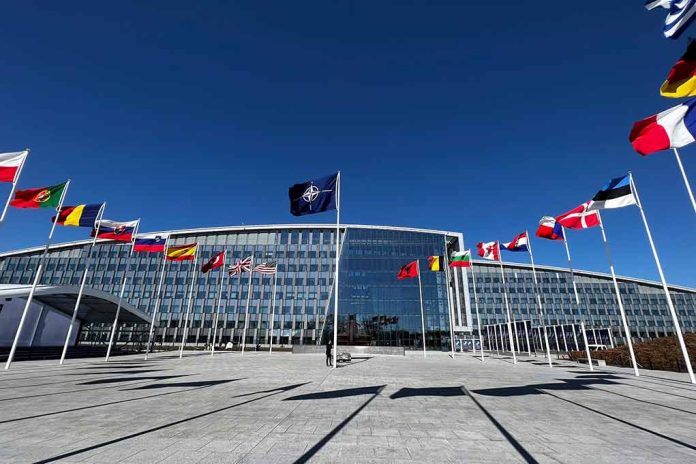🔴 Website 👉 https://u-s-news.com/
Telegram 👉 https://t.me/usnewscom_channel
Germany deploys its first permanent foreign troops since World War II to NATO’s eastern flank, marking a historic shift in European defense strategy as Russian threats intensify in the Baltic region.
Key Takeaways
- German Chancellor Friedrich Merz inaugurated the 45th Armoured Brigade “Lietuva” in Lithuania, consisting of 4,800 soldiers and 200 civilian staff
- This marks Germany’s first permanent overseas military deployment since WWII, responding directly to increased Russian aggression
- Lithuania, bordering both Russian Kaliningrad and Belarus, is considered NATO’s most vulnerable eastern flank member
- The brigade aims to be fully operational by 2027, despite significant personnel and equipment challenges facing the German military
- European nations are simultaneously implementing economic measures against Russia, including new tariffs on Russian and Belarusian fertilizers
Historic Military Deployment Signals NATO’s Resolve
In a decisive response to growing Russian aggression, Germany has established its first permanent foreign military presence since World War II. Chancellor Friedrich Merz visited Lithuania to inaugurate the 45th Armoured Brigade Lietuva, a 4,800-strong force that will be stationed on NATO’s vulnerable eastern flank. The deployment represents a dramatic shift in German foreign policy and military strategy, with Berlin committing substantial resources to defend Baltic nations directly bordering Russian territory. An advance contingent of approximately 400 Bundeswehr personnel has already arrived in Lithuania, with the full brigade expected to be combat-ready by 2027.
The decision comes amid heightened tensions throughout the region, with Russia employing hybrid warfare tactics and maintaining threatening postures toward former Soviet states. Lithuania’s strategic position makes it particularly vulnerable, as it borders both the Russian exclave of Kaliningrad and Belarus, which has become increasingly aligned with Moscow. Chancellor Merz has been unequivocal about the nature of the threat, emphasizing Germany’s unwavering commitment to collective defense and deterrence against potential Russian aggression toward NATO member states.
Strategic Significance and Military Challenges
The deployment carries enormous symbolic and practical significance. By stationing a substantial combat force in Lithuania, Germany is demonstrating its readiness to take on greater responsibility for European security at a time when many question America’s long-term commitment to NATO. The brigade represents a critical defensive capability in a region that military analysts have long identified as a potential flashpoint. Should Russia attempt any military action against the Baltic states, German forces would now be positioned as an immediate tripwire, ensuring an immediate NATO response.
“We must do everything to defend ourselves – so that we never have to,” said Friedrich Merz, German Chancellor.
However, significant challenges remain. The German military continues to struggle with recruitment and equipment shortages, issues that could hamper the full operationalization of the brigade. Berlin has initiated legislative efforts to make military service more appealing, aiming to boost Bundeswehr personnel to 203,000 by 2031. Chancellor Merz has committed to building Europe’s strongest conventional army by increasing defense spending, though skeptics question whether Germany can overcome decades of military underinvestment quickly enough to meet current threats.
Broader European Response to Russian Aggression
The military deployment represents just one component of a multi-faceted European response to Russian belligerence. The European Parliament recently voted to impose tariffs on fertilizers from Russia and Belarus, aiming to protect EU food security while limiting funding for Russia’s war machine. Meanwhile, Finland has increased security measures along its border with Russia following reports of enhanced Russian military activity. These coordinated actions demonstrate growing European resolve to counter Moscow’s influence through both military and economic means.
“Anyone who challenges NATO must know that we are prepared. Anyone who threatens any ally must know that the entire alliance will jointly defend every inch of NATO territory,” said Chancellor Friedrich Merz.
Lithuanian President Gitanas Nauseda characterized the alliance with Germany as an unbreakable force, underscoring the importance of this deployment to the Baltic nation’s security. The Kremlin, meanwhile, has maintained its aggressive posture, refusing new peace talks with Ukraine despite international pressure. Recent incidents in the Baltic Sea, including reports of Russian naval provocations and spy plane activity, further highlight the ongoing tensions that have prompted NATO’s enhanced defensive posture across its eastern territories.
